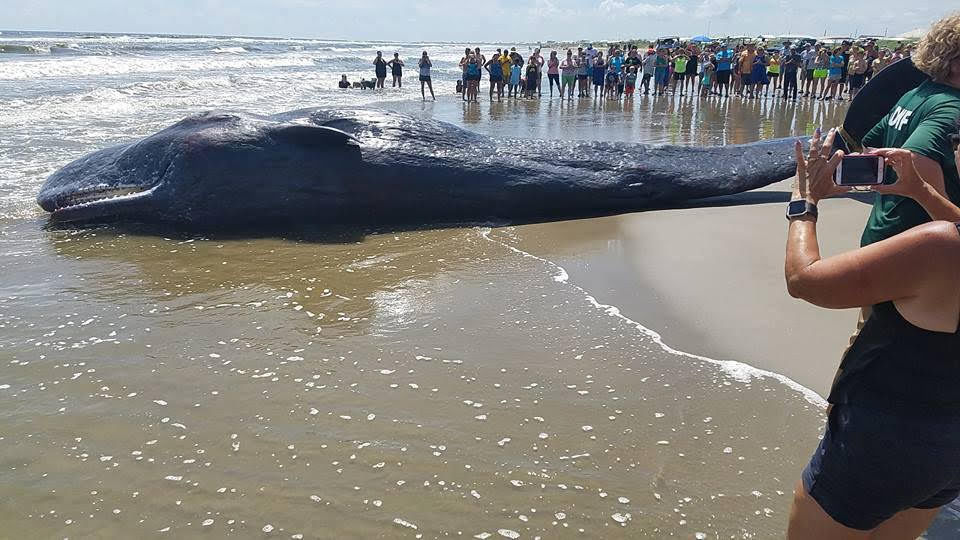
SLMA September – Preparing for flu season
September 1, 2017
Two arrested for club shootout
September 2, 2017A dead whale found near Grand Isle’s beach is the latest in a pattern of similar cases, say scientists, who don’t yet know the reason why.
The discovery of the young female sperm whale on a sandbar Saturday is the third such stranding on the Louisiana coast and the fifth in the northern Gulf of Mexico this year, said Louisiana Department of Wildlife and Fisheries biologist Mandy Tumlin, the agency’s Marine Mammal Stranding and Rescue Program coordinator.
“This was either an older juvenile or a young adult,” said Tumlin, adding in an interview that sperm whale strandings in such close succession are highly unusual.
Gulf of Mexico sperm whales are listed as endangered under federal law.
“Sperm whales found in the Gulf of Mexico are generally smaller than those found in other locations,’’ Tumlin said. “This animal was a female and they tend to be a lot smaller than males in this species. Sperm whales only have teeth on the lower jaw, those teeth have been collected and can be used in determining the age of the animal.’’
LDWF staff, Grand Isle Police and Audubon’s Coastal Wildlife Network responded to the stranding after a beach-goer reported seeing the whale. It was moved by crane onto the beach, where a necropsy was performed.
A necropsy is an autopsy performed on an animal. During the procedure biologists collected internal samples from organs and tissues that can sometimes held ascertain cause of death. When the necropsy was completed the City of Grand Isle buried the carcass on the beach, in an area removed from homes.
“It is important to note that sometimes we may not be able to identify an exact cause of death,’’ Tumlin said. “However, each and every stranding is important for obtaining valuable information about each of these species, especially in this case of an endangered species such as the sperm whale.’’
The cause of the Grand Isle whale’s death has not been determined yet, Tumlin said. Neither have the causes of death for the other two whales found on the Louisiana coast and two found, respectively, off Alabama and Florida. She also said that marks on the carcass observed by some beach-goers – and noted by the scientists – were skin-deep indentations from glancing whale bites, which are common in marine mammals and not believed related to the whale’s death. Other than that there was no other trauma observed on the body.
A 2105 stock assessment of sperm whales by NOAA Fisheries estimates a population of 763 in the northern Gulf of Mexico, though the number could be as low as 560.
That same study indicated that the Deepwater Horizon oil spill in 2010 had a greater effect on sperm whales than directly observed, and also brought up the potential that deep-water oil exploration in the Gulf could have a greater effect than realized currently, due to equipment used to look for oil.
“The waters of the northern Gulf of Mexico have been increasingly subject to extensive seismic
airgun sounds in the search for hydrocarbon deposits,” the study reads. “(The) data raise concerns that seismic surveys may impact foraging behavior in sperm whales, but more data are required to understand whether the differences were due to exposure or natural variation in sperm whale behavior.”
An unusual pattern of strandings occurred in Europe’s North Sea this past winter, with as many as 30 sperm whales reported dead in three countries within a short period of time.
LDWF encourages anyone seeing a stranded marine mammal to report it by calling 1-877-433-8299, the NOAA Southeast Region Marine Mammal Stranding Network Hotline. To report marine mammal violations, such as people feeding, attempting to feed, or harassing marine mammals in the wild, the NOAA Fisheries Enforcement Hotline is 1-800-853-1964. Information may be left anonymously. Sperm whales are protected by the Marine Mammal Protection Act as well as the Endangered Species Act.
LDWF also supplied these “Dos and DONTs” for marine mammal encounters.
DO immediately report all dead marine mammals, even if they are decomposed. Call the Southeast Region Stranding Network 24-hour hotline: 1-877-WHALE HELP (1-877-942-5343) to be connected to your state’s marine mammals stranding network. The stranding network will send out trained responders who will get to the scene quickly with appropriate equipment.
DON’T push the animal back out to sea! Stranded marine mammals may be sick or injured. Returning animals to sea delays examination and treatment and often results in the animal re-stranding in worse condition. If the animal returns to the water on its own, DON’T attempt to interact with it (swim with, ride, etc.).
DO put human safety above animal safety. If conditions are dangerous, do not attempt to approach the animal.
DO stay with the animal until rescuers arrive, but use caution. Marine mammals can be dangerous and/or carry disease. Keep a safe distance from the head and tail. Also, minimize contact with the animal (use gloves if necessary) and avoid inhaling the animal’s expired air.
If the animal is alive, DO keep its skin moist and cool by splashing water over its body. Use wet towels to help keep the skin moist and prevent sunburn.
If the animal is alive, DON’T cover or obstruct the blowhole. Try to keep sand and water away from the blowhole.
DO keep crowds away and noise levels down to avoid causing further stress to the animal.
DO keep dogs/pets away from the live or dead marine mammal.
DON’T collect any parts (tissues, teeth, bones, or gear, etc.) from dead animals. They are still covered by the Marine Mammal Protection Act.










